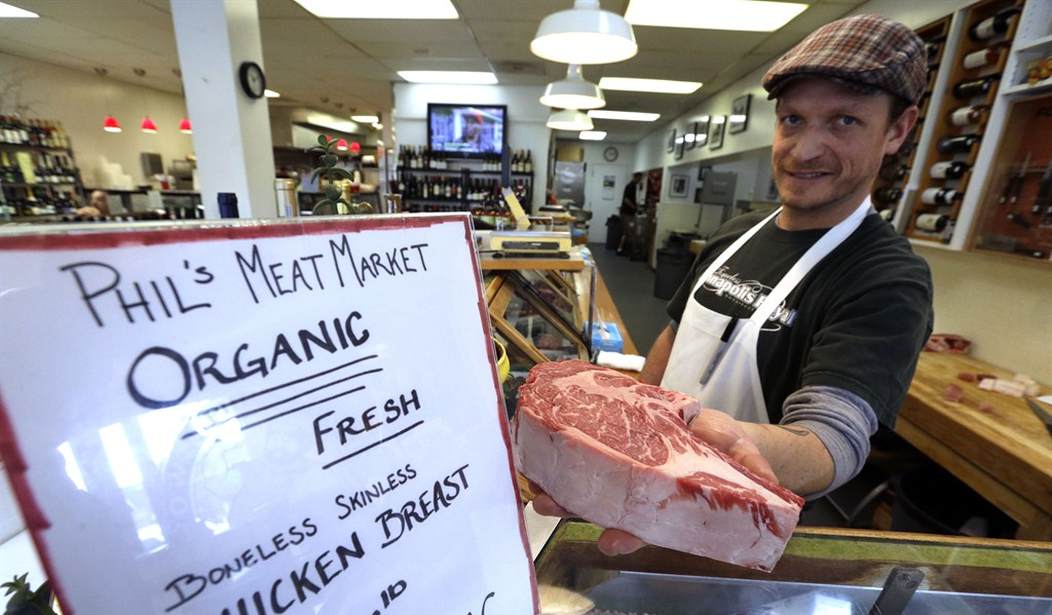Ahhh, remember those big government sycophantic freaks like Bill De Blasio who advocate bogus ideas like "meatless Monday" because it is supposedly better for your health to not eat meat? Or those left-wingers who insist that we should listen to scientists 100 percent of time and impose sweeping lifestyle changes, like all going vegan, mandated by the government for issues like obesity and global warming? Common sense informs the average American that eating meat is not bad for you. Our ancestors have been doing it for thousands of years. Elites have told you these average Americans to shut up and eat their veggie burgers as scientists. Well, based on a recent report, it looks like those elites are wrong. Scientists are now saying that actually, it is okay to eat red meat.
Here is what the New York Times reported on the latest study:
Public health officials for years have urged Americans to limit consumption of red meat and processed meats because of concerns that these foods are linked to heart disease, cancer and other ills.
But on Monday, in a remarkable turnabout, an international collaboration of researchers produced a series of analyses concluding that the advice, a bedrock of almost all dietary guidelines, is not backed by good scientific evidence.
If there are health benefits from eating less beef and pork, they are small, the researchers concluded. Indeed, the advantages are so faint that they can be discerned only when looking at large populations, the scientists said, and are not sufficient to tell individuals to change their meat-eating habits.
“The certainty of evidence for these risk reductions was low to very low,” said Bradley Johnston, an epidemiologist at Dalhousie University in Canada and leader of the group publishing the new research in the Annals of Internal Medicine.
The new analyses are among the largest such evaluations ever attempted and may influence future dietary recommendations. In many ways, they raise uncomfortable questions about dietary advice and nutritional research, and what sort of standards these studies should be held to.
So does this mean you start eating steaks, bacon, and pork everyday and all day? Probably not, unless you want to get gout. But, it does tell us that more often than not it is silly to impose government mandated lifestyles, especially based off supposedly best nutrition practices, when dietitians so often change their findings years after original claims.
Recommended
This report reminds me of another story I wrote about a man named Rob Gorske with pretty good health who ate 30,000 Big Macs. His health seemingly defied the odds. But it actually had precedent. Here's what I wrote in May of 2018:
Some readers may remember the 2004 movie, "Super Size Me." Morgan Spurlock ate nothing but McDonalds for 30 straight days. The results, he claimed, made him lethargic, over weight, and unhealthy. Many in government used the film for proof that McDonald's and other corporate food behemoths needed regulation because they were killing Americans. Limited government citizens such as Tom Naughton sought to prove that was not necessarily the case. In 2009, he recreated the "Supersize Me" premise to test Spurlock's results. In his documentary called "Fat Head," he found that his health simply came down to a matter of personal responsibility. He ate McDonald's for 30 straight days, but maintained normal caloric consumption of 2,000 calories. Naughton's health actually improved in many categories after following the same plan as Spurlock. No body was forcing him to monitor his calories, but he did so because he practiced self-governance.
To be clear, this article is not suggesting that fast food is healthy. Nor is it to suggest that zero regulation is needed. It simply is to serve as a reminder that folks such as Gorske and Naughton prove that the government does not always know best. More often than not, the health of Americans comes down to personal choice; what we choose to put in to our bodies and how we choose to take care of ourselves. Gorske, like Naughton, worked out a system where he can eat all the Big Macs he wants. Is he the healthiest individual around? Probably not, but it is not government's job to regulate his consumption. The trailer for "Fat Head" can be seen below.

























Join the conversation as a VIP Member